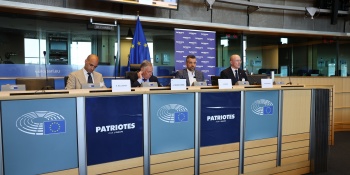Published: 23.08.2021

• Public consultations on the legislative initiative on the recognition of parenthood between Member States, announced by the European Commission in April, are underway.
• Officially, these actions are supposed to ensure the well-being of children in case of travelling or moving to another Member State.
• In reality, the Commission aims to impose on EU countries the obligation to recognise the ‘parenthood’ of same-sex couples and transcribe foreign birth certificates, in violation of national law.
• The Ordo Iuris Institute presented its position on the matter, reminding that member states have not granted the EU competence to interfere in their internal substantive family law in the Treaties, and therefore the Commission’s action in this regard exceeds its prerogatives.
• Current legislation ensures the free movement of EU citizens within the community and also regulates the recognition of the authenticity of official documents relating to, for example, parenthood.
• Also according to Polish jurisprudence, foreign vital records produce certain effects on the Polish territory and may constitute evidence in cases before common courts, so it is not necessary to introduce top-down regulations which would impose the faithful transcription of foreign vital records.
‘Legislative measures in the form proposed by the European Commission not only go beyond the competences granted to the EU in the Treaties, but also do not contribute to the implementation of the freedom of movement of persons. The existing EU Regulation of 2016 already governs the issue of mutual recognition of official documents of the Member States, without unacceptable interference in the substantive family law of the countries of the Community’, pointed out attorney-at-law Katarzyna Gęsiak, Deputy Director of the Centre of the International Law at Ordo Iuris.
Until 25 August, public consultations are held on a legislative initiative announced by the European Commission which aims at obliging all Member States to recognise in their territory parenthood certified in another Member State. In practice, this mainly concerns the recognition of adoptions by homosexual couples in countries whose laws allow it. The legislative initiative announced by the Commission would take the form of a regulation, which means that once it comes into force, it would become law in all EU countries, including those whose domestic law oppose such situations.
The Ordo Iuris Institute has once again expressed its opinion on the European Commission’s initiative in the field of family law, this time by taking part in the ongoing public consultations. The Institute’s experts criticised the Commission’s announced interference in the substantive family law of Member States by introducing the obligation to recognise parenthood certified in another country of the community. In a questionnaire made available for the purposes of the consultation, they recalled that substantive family law falls within the exclusive competence of the Member States and the adoption of legal acts by the EU in this field is contrary to the provisions of the Treaties.
The Institute’s lawyers stressed that the current legislation ensures the free movement of EU citizens within the community and also regulates the recognition of the authenticity of official documents relating to, for example, parenthood. However, these regulations do not include the recognition of the legal effects of documents issued by authorities in other member states, because the determination of such issues, such as the recognition of parenthood, is left to the individual discretion of each country. This does not change the fact that, in accordance with the jurisprudence of Polish courts, including the Supreme Court, foreign vital records produce certain effects on the territory of our country and may constitute evidence in cases before common courts. Consequently, it is not necessary to introduce top-down regulations which would impose, for example, faithful transcription of foreign vital records by the competent Polish authorities.

Wednesday's presentation in Brussels of the European Union reform plan developed by Poland’s Ordo Iuris Institute and Hungary’s Mathias Corvinus Collegium garnered significant interest. Nearly a hundred MEPs and their staff from many countries came to the presentation of this proposal.

29.05.2025
• Proceedings in the case of the German Mori family have concluded at the District Court in Gdańsk.

• The pressure on the European Union’s southern borders has continued unabated since the great migration crisis of 2015.

23.05.2025
We are currently engaging with think tanks and political parties across the continent to collaboratively develop a detailed counter-proposal to the centralist, anti-national, and anti-democratic vision of the European Union promoted by the European Parliament and President Macron.